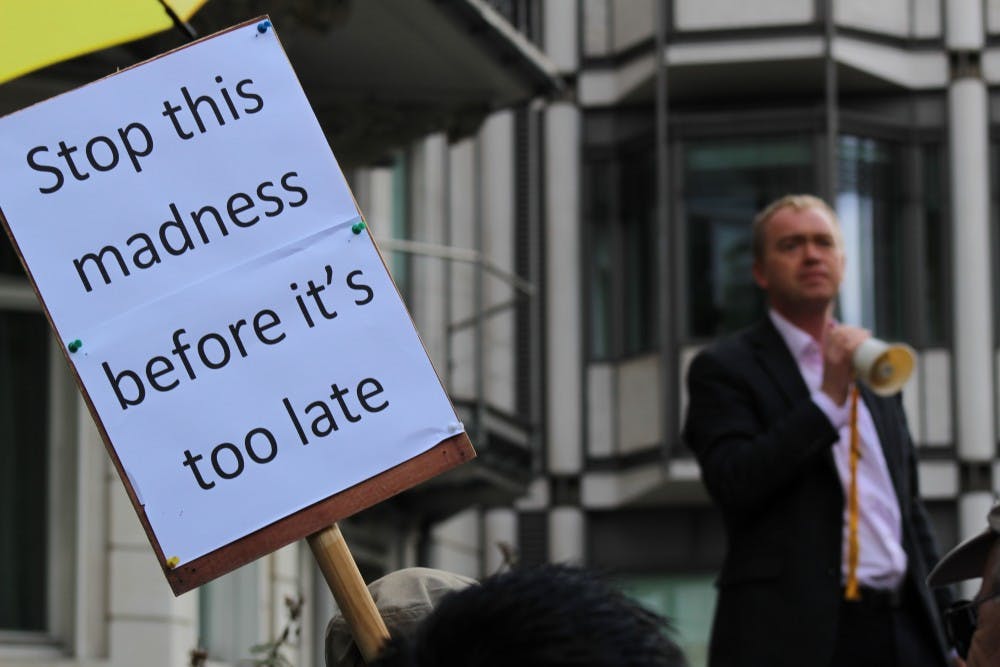LONDON — The votes were cast and counted, but the people took to the London streets in hopes there was still a way out.
Tens of thousands of people marched on Parliament on July 2 in protest of Brexit, the referendum for Britain to exit the European Union.
Although the “leave” campaign won by a margin of 1.25 million votes, many still feel the result does not reflect the desires of the public and are concerned for the future of the United Kingdom.
“It’s important to lose with grace, but it’s also important to never, ever give up,” said Tim Farron, a member of Parliament, as he addressed the crowd before the march began. “Now that it’s clear that we have been diminished and that we have lost control people will change their minds.”
Those who marched were a blend of London’s culture as they held up signs and sang chants in different languages to show their love for the EU. Some had the EU flag draped across their shoulders or painted on their faces, blue streaking from their skin as they trekked through the rain.
Although the “remain” campaign was thought to be anchored in younger generations, many different generations were present in the protest. Well-dressed elderly couples marched quietly, holding hands. Teenagers linked arms and shouted, “We want our future back!”
A young woman consoled her weeping mother as they marched, pushing children in a stroller. Red-faced, the older woman wiped at her eyes as her makeup ran, chanting through her tears.
“EU, we love you! EU, we love you!”
A little boy, missing his two front teeth, sat atop his father’s shoulders and read aloud slogans from signs.
“Fuck Brexit!” he yelped, giggling.
His father stifled a laugh.
“You’re not supposed to say that.” He smiled as he chided his son. “Just say, ‘No Brexit!’”
Several of the lewder signs depicted former mayor of London, Boris Johnson, and leader of the UK Independence Party Nigel Farage kissing, or in one case, having a bath together.
Farage and Johnson were two of Brexit’s biggest champions. Both are taking flak for misleading the public in the days leading up to the referendum and for failing to have a concrete plans for how to execute an exit from the EU.
One of the “leave” campaign’s promises was the £350 million Britain sends weekly to the EU would be given to the National Health Service.
One hour after the referendum result, Farage called the promise “a mistake” and said he never would have made that claim, despite the fact it was emblazoned on the side of a campaign bus which toured the country.
Johnson also took a step back, and said he would not run for prime minister, despite a heavy push after David Cameron’s resignation.
Protesters flooded Parliament Square, where the route terminated. Nestled between London landmarks Big Ben, the Houses of Parliament and Westminster Abbey, they heard speeches imploring them to stay united, even as their government splintered.
“We need to uphold the values of democracy and inclusiveness which are at the heart of the EU and this country,” Labor Party leader Michael Cashman said. “We must not let right-wing, narrow-minded nationalism nor xenophobia define us. We are better than that.”
The “leave” campaign promoted anti-immigrant rhetoric, stoking fears about terrorism and the influx of refugees. One “leave” poster, which depicted Farage in front of a line of Middle Eastern immigrants said, “Breaking Point: The EU has failed us all.”
Since the referendum, hate crimes in the U.K. have increased five-fold, according to the police hate crime reporting site True Vision.
Elderly people in wheelchairs fled from a care center in Manchester after it received an anonymous threat. A BBC radio presenter was racially harassed in the street in West Midlands. A halal butcher in Pleck was firebombed.
One speaker in Parliament Square was an Indian immigrant who came to London as a child. He praised London’s ethnic neighborhoods and urged people to see diversity as a positive, not to fear it.
“We must all go back to our communities and unite against this growing hate,” the man screamed. “We must stand tall and proud.”
Friederike Luepke, a teacher and German immigrant, attended the rally with her 9-year-old son, Max, who was born in London. The boy scaled a fence and waved his sign from the top: “Half German. Half Senegalese. 100% European.”
Luepke has lived in five countries and was in Berlin when the wall came down. While she said she was shocked and saddened by Britain’s decision to isolate itself, she knows there is still hope.
“Right up until the day before the wall came down, no one believed things could get better then either,” Luepke said. “I really hope the members of Parliament will step in during this very dark hour of democracy. We cannot give up.”
As the last of the marchers petered into the square, the fever of the afternoon had subsided. The final group walked through the streets, and many were confused by the relative quiet.
People had set their signs down on the pavement and sat talking quietly amongst themselves, through protesting but reluctant to leave.
“Where do we go now?” a girl asked her friend as they surveyed the square.
The other girl shrugged.
“I guess no one knows what to do.”






